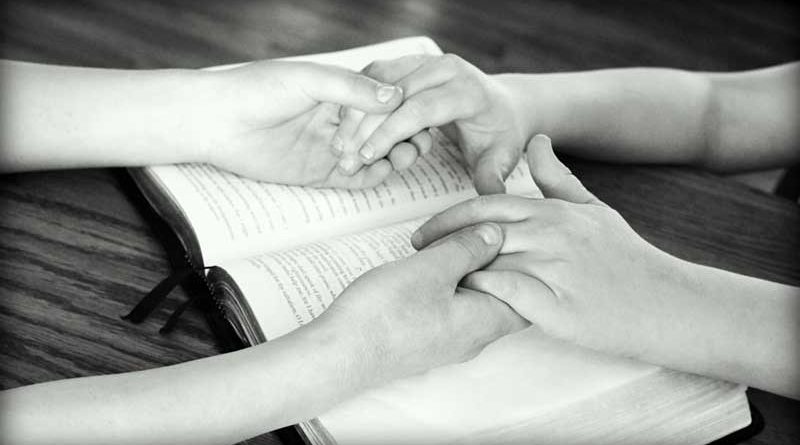2hearts and healing
We believe God has power to heal every disease and sickness and it is right to ask him to do so. But we also believe that it is wrong for us to expect Him to do so on every occasion. We cannot expect to live in mortal bodies without experiencing sickness, pain and death. It is right to ask God for healing, but we must remember He may plan to bring greater glory to His Name through our illness.
Is Satan the cause of all illness?
Acts 10:38 says that Jesus “went about doing good and healing all who were oppressed by the devil, for God was with him.” The devil had oppressed people with sickness. In Luke 13 Jesus found a woman who had been bent over unable to stand up for eighteen years. He healed her on the Sabbath and in response to the criticism of the synagogue ruler he said (in verse 16), “Ought not this woman, a daughter of Abraham whom Satan bound for eighteen years, be loosed from this bond on the Sabbath day?” There is no doubt that Satan causes much disease.
But Satan is not sovereign in our diseases. When Satan went to God for permission to strike Job’s body, Job 2:7 says, “Satan went out from the presence of the Lord and smote Job with sore boils from the sole of his foot to the crown of his head.” When Job’s wife despaired and said, “Curse God and die” (2:9), Job responded exactly as he did before. He looked past the finite cause of Satan to the ultimate cause of God and said, “Shall we receive good from God, and shall we not accept evil?” (2:10).
Did Christ die that we might be healed?
Jesus Christ died to purchase our redemption. Isaiah 53:5–6 “But he was wounded for our transgressions, he was bruised for our iniquities; upon him was the chastisement that made us whole, and with his stripes we are healed. All we like sheep have gone astray; we have turned every one to his own way; and the Lord has laid on him the iniquity of us all.”
The blessing of forgiveness and the blessing of physical healing were purchased by Christ when he died for us on the cross. And all those who put their trust in Him shall have both of these benefits. But when will that be? That is the question of today. When will we be healed? When will our bodies no longer be enslaved to corruption?
The ministry of Jesus was a ministry of healing and forgiveness. He said to the disciples of John the Baptist, “Go and tell John what you see and hear: the blind receive their sight, the lame walk, the lepers are cleansed and the deaf hear, and the dead are raised up, and the poor have good news preached to them. And blessed is he who takes no offense at me” (Matthew 11:4–6). Why would anyone take offense at one who raises the dead and brings in the long expected kingdom? Because he only raised about three people. He left hundreds in the tombs all around him. Why? Because not enough relatives had faith? O no! When Jesus raised the widow’s son in Luke 7:13, 14, she didn’t know him from Adam. It was not because of her faith. All it says is, “He had compassion on her.” What then? Didn’t he pity all the other bereaved in Israel?
Jesus raised some of the dead to illustrate that he has that power and one day will come again and exercise it for all his people. And he healed the sick to illustrate that in his final kingdom his is how it will be. There will be no more crying or pain any more.
But we do have a foretaste of our redemption now in this age. The benefits purchased by the cross can be enjoyed in measure even now, including healing. God can and does heal the sick now in answer to our prayers. But not always. There are those who say that Jesus wants you well now and heap guilt after guilt on the back of God’s people. They assert that the only thing between them and health is unbelief, and have failed to understand the nature of God’s purposes in this fallen age. They have minimized the depth of sin and God’s purifying chastening and the value of faith through suffering. They are guilty of trying to force into this age what God has reserved for the next.
See Romans 8:23, 24: “We ourselves, having the first fruits of the Spirit, even we ourselves groan in ourselves waiting eagerly for our adoption as sons, the redemption of our bodies, for in hope we have been saved.” Because of Christ’s purchased redemption, believers already have received the Holy Spirit. This is like a down payment of our full redemption, but it is only a foretaste. We, who have this Spirit groan awaiting the redemption of our bodies.” He goes on to say in verse 24, “For we have been saved in hope.” Our salvation is not finished, it is only begun. We are saved only in hope. This is true morally; Paul says in Galatians 5:5, “We through the Spirit by faith are waiting for the hope of righteousness.” And it is true physically; we wait for the redemption of our bodies. Christ has purchased that redemption, and given us a foretaste of it by healing many people, some miraculously, but some very slowly, some only partly, and some not at all.
Should we pray for healing or for sustaining grace?
We should pray for God’s help both to heal and to strengthen faith while we are unhealed. It is fitting that a child ask his father for relief in trouble. And it is fitting that a loving Father give his child only what is best. Sometimes He brings healing now, and sometimes not. But always, always He does what is best for us.
But how shall we know when to stop asking for healing and only ask for grace to trust his goodness? Paul had faced this problem in his own experience. In 2 Corinthians 12:7-10 we read how Paul was given a thorn in the flesh which he called a “messenger of Satan.” We don’t know what sort of pain or malady it was, but he says that he prayed three times for its removal. But then God gave him the assurance that though he would not heal him, yet his grace would be sufficient and his power would be manifest not in healing but in the faithful service of Paul through suffering.
In Romans 8:26, 27 Paul addresses the same problem. While we are waiting for the redemption of our bodies “the Spirit helps us in our weaknesses; for we do not know how to pray as we should, but the Spirit himself intercedes for us with groanings too deep for words and he (God) who searches the hearts knows what the mind of the Spirit is because he intercedes for the saints according to the will of God.” Sometimes all we can do is cry out for help because we do not know in what form the help should come. The Spirit of God takes our stumbling, uncertain expressions of need and brings them before God in a form that accords with God’s intentions. And God responds graciously and meets our needs. Not always as we at first hoped, but always for our good. Llet us run to our Father in prayer and plead for help in time of need.
What if God does not heal?
Physical healing is not the only miracle. God is glorified when he heals and when he gives a peace that passes understanding to the person that he does not heal. Both are miracles of grace.
Joni Eareckson after a long struggle with paralysis and depression, wrote at the end of her book: “The girl who became emotionally distraught, and wavered at each new set of circumstances is now grown up, a woman who has learned to rely on God’s sovereignty” (Joni, p. 190).


